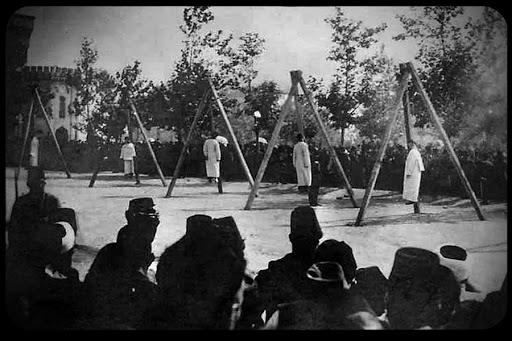True to his reputation for being outspoken, Pope Francis risked a diplomatic upheaval by referring to the 1917 slaughter of Armenian Christians as “genocide.” The Armenian genocide took place at the end of the first world war when Turks rose up against their Christian neighbors—forcing them from their homes, actively slaughtering some and driving others to their deaths in the desert. The Turkish government continues to whitewash the tragedy as a result of “civil unrest” while the majority of the world names it “genocide.”
Sunday’s Mass was originally meant to be a celebration to declare St. Gregory of Narek a doctor of the church, but as the centenary commemorations of the genocide are beginning, Pope Francis insisted that the Mass also be an opportunity to remember the Armenian martyrs. His decision caused upset within the Turkish diplomatic community with Turkey’s ambassador being withdrawn from the Vatican and a Turkish official commenting that the Pope’s words had contradicted his message of peace and dialogue during his visit to Turkey in November.
The Armenian Patriarch Karekin II replied, “we cannot forget this crime against humanity…the Armenian genocide is forever rooted in the consciousness of the Armenian people. Any attempt to erase it from history is destined to fail.”
Francis also used the opportunity to remember other historic anti-Christian onslaughts and to condemn the rising tide of persecution against Christians in the world today. “Concealing or denying evil” the pontiff said, “is like allowing a wound to keep bleeding without bandaging it!” He repeated his claim that we are engaged even now in a third world war in which, in a piecemeal fashion, we witness slaughter, beheadings, people being driven from their homes, genocide, kidnappings, torture, murder, beheadings and crucifixions.
Pope Francis speaks about this issue not only out of a sense of outrage at injustice and compassion for the suffering, but because he has experienced injustice and cruelty firsthand. As the head of the Jesuits in his homeland during Argentina’s Dirty War, Francis witnessed the horror of a repressive government engaged in kidnapping, torture, brutality and widespread cruelty. In Argentina the repression was mostly political, but many innocent victims of the right wing purge suffered enormously and priests, nuns and outspoken Catholics were not exempt from attack.
Pope Francis’ commemoration of the Armenian martyrs, follows his identification with the twenty-one Copts martyred in Algeria and the Christians being persecuted in Nigeria and Syria. His advocacy for the persecuted not only reminds the world that Christians are being persecuted, but he also reveals that persecution is one of the marks of being a disciple of Jesus Christ.
Jesus told his followers that they should take up their cross and follow him and warned them that “all men will hate you for my sake.” Alertly aware of the role of Satan in world affairs, Pope Francis knows that the devil hates Jesus Christ and his church, and realizes that the persecution of Christians is part of a greater cosmic battle between the forces of good and the power of evil in the world.
Finally, Pope Francis stands up for the persecuted as a reminder not only that persecution of Christians is rife in the world today, but also that it is increasing, and that it may rear its ugly head anywhere. As John Allen points out in his seminal work, The Global War on Christians, persecution of Christians is not only a problem in Muslim countries. It exists in many forms and for many reasons around the world. Like the Armenian genocide, the persecution may have ethnic, historical and civil aspects, but when people are targeted simply because they hold to the Christian faith, it is religious persecution and those who are suffering are rightly called martyrs.
Fr Dwight Longenecker is a popular conference speaker and leader of parish missions. Read his blog, browse his books and be in touch at dwightlongenecker.com.

